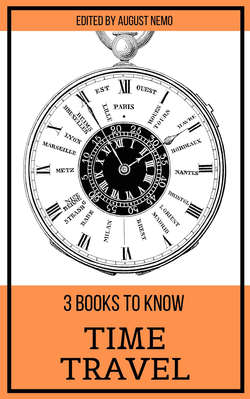Читать книгу 3 books to know Time Travel - H. G. Wells, ReadOn Classics, Charles Dudley Warner - Страница 33
На сайте Литреса книга снята с продажи.
Nineteenth-Century Books.
Оглавление––––––––
AS I LOOKED ROUND, I saw one of the junior attendants engaged in gumming the leaves of a musty book on sheets of collodion, so that one side of the leaf remained at least legible. I remembered that this was the way in which the papyrus scrolls of Pompeii and Herculaneum were preserved from utter destruction; but how great was my astonishment to see that the title-page of the musty book bore the year mark 1860, Amsterdam. “So it is with most of the nineteenth-century books,” said Bacon. “Owing to the bleaching properties of chlorine, the paper on which they have been printed got so thin, and mouldy, and worm-eaten, that we have but few works of those days now left; and that is really to be regretted, for many writings of that time were quite worth preserving.”
I must confess that I was sorry to hear this little bit of information, so distressing to an author of that age; but, of course, I was silent, and kept on following my guide through rows and rows of apartments, until we arrived at last at a vast hall, literally crammed with books from top to bottom. There we paused, and Bacon turned round to address me. “Now we are among the literature of the two-winged insects; what work do you wish to see?” But staring at those thousands of volumes of treatises on gnats and flies, I was too much afraid again to betray my ignorance; I felt sure I would hit upon some title or other to convince my guide how little I was au courant of the twenty-first century. I limited myself to expressing my gratification at what I had already seen, and added that I would not trespass any further upon the obliging courtesy of my friend.
And thus we left the National Library, an institution which they might safely have called the bibliopolis, for indeed it was like a city of books.
As we passed once more through the front gate on our return, we came across a crowd of men who were about to enter, and whom I judged by their dress and appearance to belong to the class of artizans. I asked Bacon what business had those people there?
“These are workmen from a neighbouring factory,” answered he; “they come here in turns for an hour every day, in order to read in yonder room, especially set apart for them, such books as the library committee has judged to be adapted to their wants. Such workmen’s libraries exist in all the several quarters of the city, but they are most numerous in the densely populated districts where most factories are to be found.”
“And are they well frequented? And do employers allow their workmen to make use of them? And have they reduced their wages in consequence? Are they not afraid that their men will thus become too clever, too well educated?”
“With regard to your first two questions—yes; with regard to the latter two—no. So far as employers are concerned, they have long been taught by experience that, by allowing their employés one hour’s relaxation daily, they act in their own interest; that is to say, when such an hour’s “holiday” be turned to good account by the men themselves, by learning something more about their business, and contributing to their mental development generally. Besides, what else could have happened, since the continual invention of new machinery has done away with so much of our manual labour? Naturally enough, a greater demand has set in among the working classes for knowledge and intellectual culture, and this has shown itself in the same proportion as the demand for mere handicraft has subsided.”
“Pity, though,” said I, “for those who cannot make use of the library.”
“Cannot!” exclaimed my guide; “but the doors are open to every one.”
“Except to those who are unable to read, I suppose.”
“Unable to read!” retorted Bacon; “but we are in Europe, my dear sir, not among the Hottentots or Bushmen! There is not one man or woman amongst us but what can read and write, and even do some arithmetic.Surely these elements of knowledge are the very first steps on the field of culture, and the sine quâ non of a person’s being a useful member of society.”
“Do I then understand from your remarks that you have arrived at last at a system of
